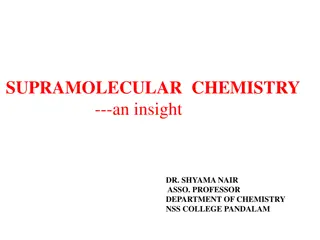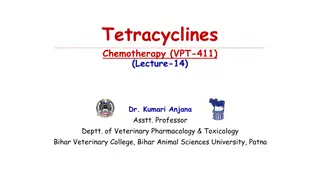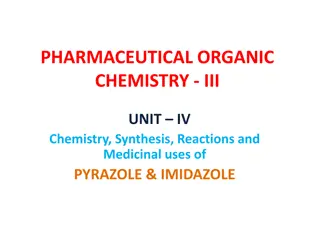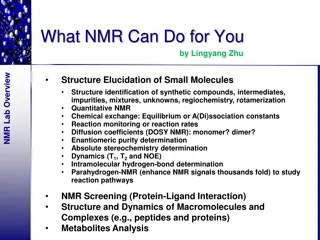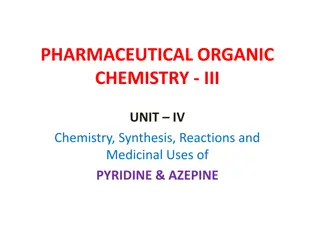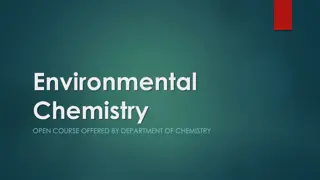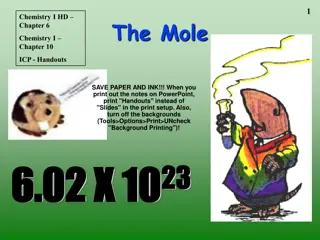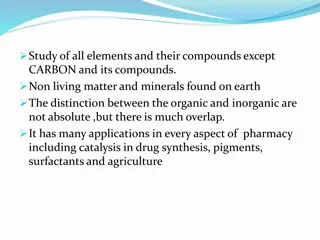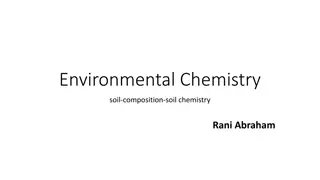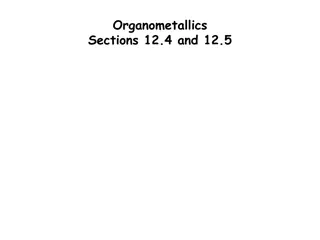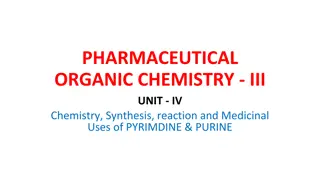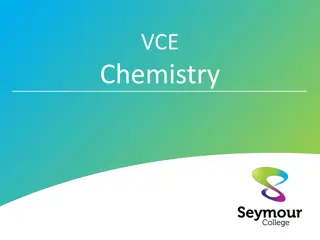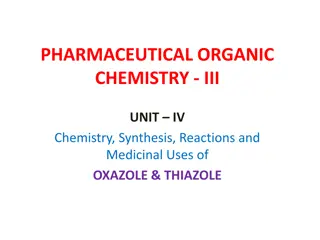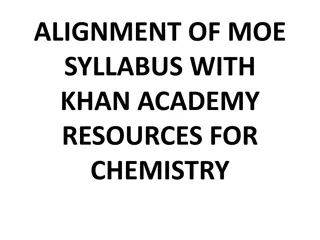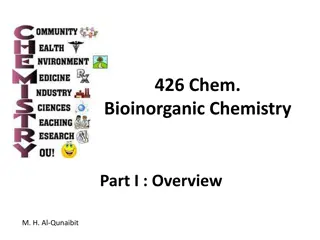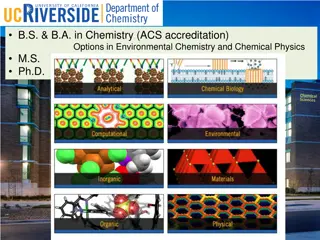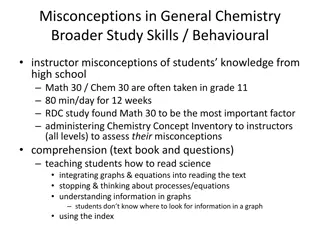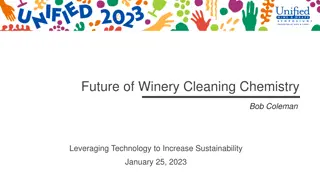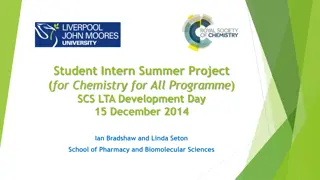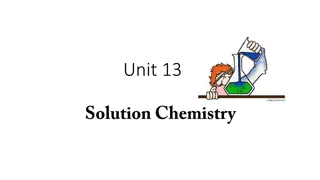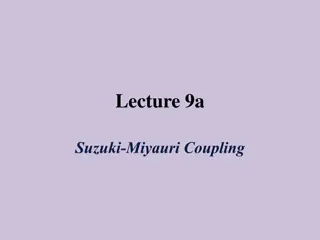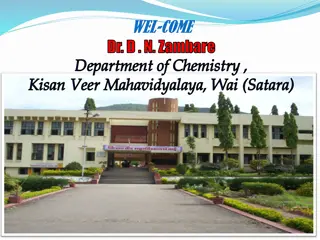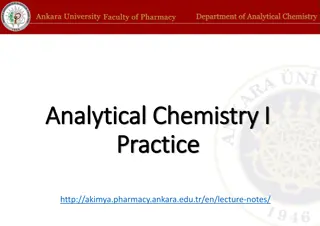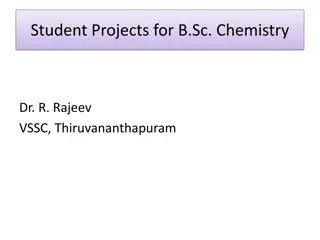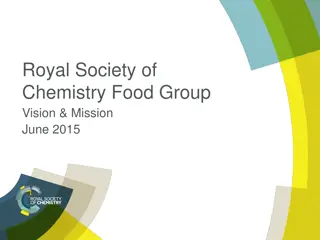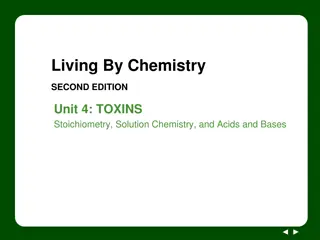Organometallic Chemistry (CHEM 42 1)
Organometallic chemistry delves into compounds with carbon-metal bonds, merging concepts from inorganic and organic chemistry. The field encompasses diverse compounds like ferrocene and tris(triphenylphosphine)rhodium carbonyl hydride, with nomenclature based on naming organic groups and adding meta
1 views • 13 slides
Introduction to Co-ordination Chemistry: Fundamentals and Applications
Explore the fascinating field of coordination chemistry, delving into the complexity of compounds and the coordination bonds that govern their structures. Discover the history, key concepts, and applications of coordination chemistry through a detailed examination of coordination compounds, bonding
13 views • 73 slides
Organometallic Compounds of Group 2 Elements
In the realm of organometallic chemistry, Group 2 elements, specifically alkaline earth metals like beryllium and magnesium, exhibit intriguing properties and reactivities. The chemistry of these elements, mimicking that of Group 12 elements in many aspects, leads to the formation of various organom
5 views • 27 slides
Fuel Your Success Conquer the IB Chemistry (SL and HL) Examination
Ignite your potential and achieve excellence in the IB Chemistry (SL and HL) Examination with our comprehensive study resources. Access practice exams, study guides, and expert guidance to excel in your test. Start your journey towards academic success today!\nClick Here to Get IB-Chemistry Dumps Wi
4 views • 6 slides
Exploring Supramolecular Chemistry: Insights and Applications
Supramolecular chemistry delves into the chemistry of molecular assemblies, intermolecular bonds, and non-covalent interactions, leading to the formation of supra-molecules through aggregation of molecular subunits. Concepts like molecular recognition, self-organization, and host-guest chemistry pla
0 views • 18 slides
Understanding Tetracyclines: Chemistry, History, and Applications
Tetracyclines are a group of natural and synthetic antibiotics with a unique chemical structure and broad-spectrum antimicrobial activity. They were first discovered through soil microorganism screening and have since become a cornerstone in modern chemotherapy. This chapter delves into their introd
0 views • 31 slides
Chemistry and Medicinal Uses of Pyrazole & Imidazole
Explore the chemistry, synthesis, reactions, and medicinal applications of pyrazole and imidazole compounds in pharmaceutical organic chemistry. Dive deeper into the molecular structures and understand the significance of these compounds in drug development and therapy.
1 views • 20 slides
NMR Applications in Organic Chemistry Research
NMR (Nuclear Magnetic Resonance) is a powerful technique used in organic chemistry research for a wide range of applications, including structure elucidation, identification of small molecules, quantitative analysis, and studying dynamics. Through various NMR experiments, researchers can determine s
1 views • 13 slides
Chemistry, Synthesis, Reactions, and Medicinal Uses of Pyridine & Azepine
Explore the fascinating world of pharmaceutical organic chemistry with a focus on Pyridine and Azepine. Learn about the chemistry, synthesis, reactions, and medicinal applications of these important compounds through a series of informative slides. Delve into the structural characteristics, synthesi
2 views • 23 slides
Environmental Chemistry Open Course: Understanding Pollution and Control Measures
Dive into the world of environmental chemistry with this comprehensive open course offered by the Department of Chemistry. Explore the causes, effects, and control measures of air, water, soil, noise, thermal, light, and radioactive pollutions. Gain insights into pollution terminology, water quality
3 views • 9 slides
Exploring the Mole: A Fascinating Dive into Chemistry Concepts
Delve into the world of chemistry with a focus on the mole, stoichiometry, Avogadro's number, and the quantitative aspects of chemical reactions. Explore the significance of 6.02 x 10^23, learn about the origins of Avogadro's number, and grasp the vastness of a mole through intriguing analogies. Dis
0 views • 33 slides
Inorganic Pharmaceutical Chemistry: Applications and Importance
Inorganic pharmaceutical chemistry explores the study of elements and compounds excluding carbon, with diverse applications in pharmacy. It encompasses the synthesis and use of inorganic compounds in drug development, catalysis, pigments, and agriculture. The field also delves into the medicinal val
1 views • 6 slides
Understanding Soil Chemistry and Redox Reactions in Environmental Chemistry
Soil chemistry plays a crucial role in sustaining healthy soils by influencing nutrient availability through oxidation and reduction processes. Redox reactions in soil are impacted by factors like oxygen content and water presence, affecting nutrient supplies. The redox status of soil reflects its n
1 views • 92 slides
Exploring the Fascinating World of Grignard Reagent in Organometallic Chemistry
Delve into the significance of the Grignard Reagent, a pivotal discovery honored with the Nobel Prize in Chemistry in 1912 for its transformative impact on organic chemistry. Unveil the versatile applications and reactions of this essential reagent, showcasing its ability to react with various subst
0 views • 42 slides
Chemistry, Synthesis, Reactions, and Medicinal Uses of Pyrimidine & Purine
Explore the fascinating world of pharmaceutical organic chemistry in Unit IV, focusing on the chemistry, synthesis, reactions, and medicinal applications of Pyrimidine and Purine compounds. Dive deep into the structures, properties, and pharmacological significance of these essential molecules throu
1 views • 15 slides
Explore Chemistry with Seymour College - VCE Chemistry Course Overview
Dive into the world of chemistry with Seymour College's VCE Chemistry course. Discover the nature of matter, chemical reactions, design innovation, and carbon compounds. Explore diverse pathways in environmental technology, academia, health sciences, and more. Prepare for a challenging yet rewarding
0 views • 5 slides
Chemistry, Synthesis, Reactions, and Medicinal Uses of Oxazole & Thiazole
Explore the world of pharmaceutical organic chemistry in Unit IV, delving into the chemistry, synthesis, reactions, and medicinal applications of Oxazole and Thiazole. Gain insights into the structures, synthesis methods, and pharmacological significance of these important compounds through detailed
0 views • 18 slides
Understanding Chemistry through Open-Ended Questions
The content provides a detailed assessment of student responses to open-ended chemistry questions related to hydrogen peroxide and its applications in teeth whitening gels. Various student answers are analyzed based on their understanding of the chemistry concepts involved, with explanations given f
1 views • 18 slides
Comprehensive Alignment of MOE Chemistry Syllabus with Khan Academy Resources
This comprehensive alignment showcases the correlation between the Ministry of Education (MOE) chemistry syllabus and the educational resources provided by Khan Academy. It covers various topics in chemistry such as the particulate nature of matter, atomic structure, chemical bonding, stoichiometry,
1 views • 9 slides
Understanding Flow Chemistry for Efficient Chemical Reactions
Flow chemistry, also known as continuous flow or plug flow chemistry, revolutionizes chemical reactions by running them in a continuous flow stream. This dynamic process offers efficient manufacturing of chemical products with precise control over critical parameters like stoichiometry, mixing, temp
2 views • 7 slides
Exploring Bioinorganic Chemistry: Connecting Inorganic and Biochemistry
Bioinorganic Chemistry bridges the gap between inorganic chemistry and biochemistry, understanding the vital role of inorganic elements in living systems. This interdisciplinary field delves into the structure, function, and exploitation of metal ions in biological processes, emphasizing their inter
0 views • 47 slides
UC Riverside Chemistry Program: Excellence in Education and Research
UC Riverside's Chemistry Program offers a range of options in ACS-accredited Chemistry education, with highlights including a distinguished faculty, substantial research funding, and high rankings. The program also boasts a Nobel Prize-winning faculty member and a comprehensive curriculum that cover
0 views • 5 slides
Overcoming Misconceptions in Chemistry Education
Addressing misconceptions in general chemistry education, focusing on student knowledge from high school Math and Chemistry courses. Emphasis on student motivation, learning strategies, and common misconceptions in understanding scientific concepts. Strategies for enhancing comprehension, applicatio
0 views • 12 slides
Innovations in Winery Cleaning Chemistry for Sustainability
Explore the future of winery cleaning chemistry through leveraging technology and sustainable practices. Considerations for chemistry selection focusing on safety, hazardous materials, employee well-being, and environmental impact are highlighted. Current cleaning chemistry practices, including the
0 views • 19 slides
Overview of LJMU Chemistry for All Programme Summer Internship Project
LJMU's Chemistry for All Programme aims to enhance student experiences through summer internships, curriculum development, and outreach activities. The project, funded by the Royal Society of Chemistry, involves a cross-university collaboration to engage local schools and foster interest in chemistr
0 views • 21 slides
Understanding Density Functional Theory in Computational Chemistry
Dive into the formalism and applications of Density Functional Theory (DFT) through a comprehensive review of basic theory, equations, and numerical implementations. Explore concepts like Time-Dependent DFT (TDDFT) and Linear Response formalism, and discover its applications in studying plasmons, co
0 views • 26 slides
Understanding Solution Concentration in Chemistry
Solutions in chemistry are homogeneous mixtures of two or more substances where each maintains its own chemical identity. They consist of a solute, the substance being dissolved, and a solvent, the substance used to dissolve the solute. Solution concentration can be described qualitatively as concen
0 views • 17 slides
Chemistry Class Announcements and Demonstrations
Chemistry class announcements include details about an upcoming exam, homework deadlines, and lab submissions. Additionally, demonstrations on solution molarity and concentration are provided to help students understand key concepts. The content also touches on the Flint, Michigan water crisis, illu
0 views • 11 slides
Innovative Green Chemistry Approach in Polycarbonate Plastic Production
Revolutionizing the production of polycarbonate plastic, this innovative green chemistry approach compares traditional and greener methods. Highlighting the properties and uses of polycarbonate, it delves into its applications in electronics, construction, data storage, automotive, medical field, an
0 views • 27 slides
Overview of Organometallic Compounds in Chemistry
Metalorganic and organometallic compounds play vital roles in organic chemistry, showcasing unique characteristics and diverse applications. From the pioneering discoveries of Cadet's fuming liquid to modern palladium-catalyzed reactions like Heck and Suzuki coupling, this field has continually evol
0 views • 18 slides
Understanding Chelation Chemistry: Structural Requirements, Ligands, and Applications
Chelation chemistry involves the formation of specific complexes known as chelates, characterized by ligands that coordinate with a central metal ion. This article explores the structural requirements for chelate formation, the role of chelating agents like EDTA and DMG, and the difference between m
0 views • 27 slides
Exploring Analytical Chemistry: Course Overview and Objectives
This article provides insights into the field of Analytical Chemistry, outlining a course syllabus, objectives, topics covered, and grading criteria. Analytical Chemistry involves obtaining and processing information about the composition and structure of matter. Analytical chemists play a crucial r
0 views • 15 slides
Exploration of Synthesis Methods and Applications of Iron Oxide in Chemistry Projects
Delve into the world of iron oxide synthesis and applications in chemistry projects, covering topics such as the properties, precipitation techniques, and particle characteristics. Learn about the various phases of iron oxide and different synthesis methods, from precipitation to combustion techniqu
0 views • 28 slides
Royal Society of Chemistry Food Group Vision & Mission Summary
The Royal Society of Chemistry Food Group aims to lead, promote, and disseminate the understanding and importance of chemistry in food. Their vision is to enhance food and nutrition security through advancing the chemistry of food ingredients. They strive to engage with various communities to promot
0 views • 4 slides
Understanding Surface Chemistry and Adsorption Phenomena
Surface chemistry is a crucial branch of chemistry that focuses on the chemical processes occurring at interfaces between different surfaces like solid-liquid, solid-gas, and liquid-gas. This field plays a significant role in various industries, including electronics. Adsorption, absorption, and sor
0 views • 15 slides
Chemistry 1151K Course Overview and Chapters Summary
Upon completion of the CHEM 1151K course, students will apply the scientific method to investigate chemical questions in allied health, utilize dimensional analysis to solve quantitative problems, communicate effectively using chemical terminology and symbols, describe the behavior of biochemical so
0 views • 44 slides
Biochemistry and Chemistry Elective Courses Overview at SRCASW
The Shaheed Rajguru College of Applied Sciences for Women offers elective courses in Biochemistry and Chemistry. The Biochemistry course covers biomolecules like amino acids, proteins, carbohydrates, lipids, and nucleic acids, emphasizing their properties and functions. It also includes practical ex
0 views • 19 slides
Understanding Spectrophotometry: Principles and Applications
Spectrophotometry is a valuable method for measuring the absorption of light by chemical substances, aiding in quantitative analysis in various fields such as chemistry, biochemistry, and clinical applications. This technique involves utilizing spectrophotometers to detect the intensity of light abs
0 views • 21 slides
Understanding Molar Mass and Conversions in Chemistry
Explore the concept of molar mass, moles of atoms, and conversions between mass and moles in chemistry through an engaging lesson on toxins, stoichiometry, solution chemistry, and acids and bases. Learn how to calculate molar mass, describe the magnitude of a mole of a substance, and conduct simple
0 views • 10 slides
Supercritical Fluid Chromatography: History, Principles, and Applications
Supercritical Fluid Chromatography (SFC) has a rich history dating back to the 1960s, utilizing supercritical CO2 as a mobile phase for chromatographic separations. SFC offers advantages such as high efficiency, chiral separations, and green chemistry applications. Despite being overshadowed by HPLC
0 views • 27 slides




